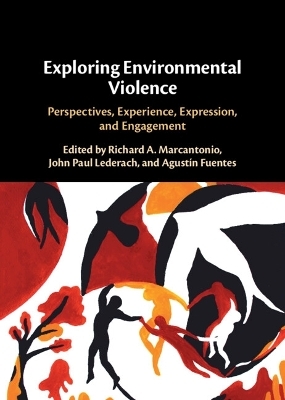
Exploring Environmental Violence
Cambridge University Press (Verlag)
978-1-009-41714-3 (ISBN)
The contributors to this book represent a wide breadth of scholarly approaches, including law, social and environmental science, engineering, as well as from the arts and humanities. The chapters explore what environmental violence is and does, and the variety of ways in which it affects different communities. The authors draw on empirical data from around the globe, including Ukraine, French Polynesia, Latin America, and the Arctic. The variety of responses to environmental violence by different communities, whether through active resistance or the creative arts, are also discussed, providing the foundation on which to build alternatives to the potentially damaging trajectory on which humans currently find themselves. This book is indispensable for researchers and policymakers in environmental policy and peacebuilding. This title is also available as Open Access on Cambridge Core.
Richard A. Marcantonio is an assistant professor at the Joan B. Kroc Institute at the University of Notre Dame focused on regenerative livelihoods, environmental management, environmental and other violence, and peacebuilding. He is the author of Environmental Violence: In the Earth System and the Human Niche (Cambridge University Press, 2022) and coauthor of the textbook Environmental Management: Concepts and Practical Skills (Cambridge University Press, 2022). John Paul Lederach is a Senior Fellow at Humanity United and Professor Emeritus of International Peacebuilding at the Joan B. Kroc Institute at the University of Notre Dame. An active conciliation practitioner, he is author of The Moral Imagination: The Art and Soul of Building Peace (2005, Oxford University Press). Agustín Fuentes is a Professor of Anthropology at Princeton University, researching human evolution, multispecies anthropology, sex/gender, and structures of race and racism. Fuentes' books include Race, Monogamy, and Other Lies They Told You: Busting Myths about Human Nature (2012, University of California Press), The Creative Spark: How Imagination Made Humans Exceptional (Dutton, 2017) , and Why We Believe: Evolution and the Human Way of Being (Yale University Press, 2019).
List of contributors; Acknowledgements; Environmental silence: a century dedicated to the nine million John Paul Lederach; Introducing this collection Richard A. Marcantonio, John Paul Lederach and Agustín Fuentes; Part I. Geographies of Environmental Violence: 1. Chornobyl body politics: making environmental violence visible Nathaniel Ray Pickett and Shannon O'Lear; 2. Cleaning our messes: the unprotected workers keeping climate change at bay Jessica McManus Warnell; 3. Inuit nunangat and the blue pacific-counter-mapping and counter-narrating indigenous space in the Arctic and Pacific Ocean Lydia Schoeppner; 4. Prior consultation in Latin American extractives: structural forces behind environmental violence Maiah Jaskoski; 5. Radiological risk imposition as environmental violence: a case study of nuclear harms and the limits of legal redress in French Polynesia/Mā'ohi Nui Sonya Schoenberger; Part II. Critical Engagement-of and With Environmental Violence: 6. Sustainable development: how its pursuit relates to environmental violence and why we should replace it with the concept of sustainable life Alice Damiano; 7. The affluence-technology connection in the struggle for sustainability John Mulrow, Alex Jensen and Daniel Horen-Greenford; 8. Epistemic and environmental violence in Latin American environmental decolonial thought Luis Pena; 9. A degrowth perspective on environmental violence Mariam Abazeri, John Mulrow, Shantanu Pai and Max Ajl; 10. 'Don't look up,' environmental violence and apocalyptic climate allegories Christiana Zenner; 11. The normative environmental discourse in pablo neruda's 'alturas de macchu picchu' Santiago Navarrete Astorquiza; Part III. Environmental Violence Impacts, Responses, Resistance and Alternatives: 12. Environmental displacement and political violence Angela Chesler; 13. A catholic peacebuilding response to the environmental violence of mining Caesar Montevecchio; 14. Environmental violence and agriculture: incorporating jacques ellul's theory of technique and technological morality to the environmental violence framework Paul Stock; 15. Artistic witness and response to environmental violence Antonia Sohns; 16. Materialistic lifestyles as facilitators of environmental violence: can flow experiences offer an antidote? Amy Isham; Part IV. Conclusion: Conclusion Richard A. Marcantonio, John Paul Lederach and Agustín Fuentes.
| Erscheinungsdatum | 27.04.2024 |
|---|---|
| Zusatzinfo | Worked examples or Exercises |
| Verlagsort | Cambridge |
| Sprache | englisch |
| Maße | 175 x 251 mm |
| Gewicht | 860 g |
| Themenwelt | Naturwissenschaften ► Biologie ► Ökologie / Naturschutz |
| Recht / Steuern ► EU / Internationales Recht | |
| Recht / Steuern ► Öffentliches Recht ► Umweltrecht | |
| Wirtschaft ► Volkswirtschaftslehre | |
| ISBN-10 | 1-009-41714-2 / 1009417142 |
| ISBN-13 | 978-1-009-41714-3 / 9781009417143 |
| Zustand | Neuware |
| Informationen gemäß Produktsicherheitsverordnung (GPSR) | |
| Haben Sie eine Frage zum Produkt? |
aus dem Bereich


